As reports of student stress and suicides because of academic, peer, and parental pressures multiply, the country’s traditionally lackadaisical school and college managements have been forced to wake up to the importance of student counseling services to help children and young adults cope academically, emotionally and socially. Neelanjana Mitra & Summiya Yasmeen investigate
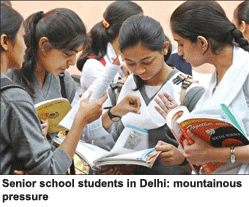 The tragic suicide of Rouvanjit Rawla, a class VIII student of La Martiniere for Boys, Kolkata who ended his life in February this year, reportedly because he couldn’t bear the humil-iation of corporal punishment regularly inflicted upon him by his teachers, and the spate of student suicides which have been widely reported in India’s commercial capital Mumbai over the past few months, have highlighted the importance of an area of darkness in Indian education — student counseling.
The tragic suicide of Rouvanjit Rawla, a class VIII student of La Martiniere for Boys, Kolkata who ended his life in February this year, reportedly because he couldn’t bear the humil-iation of corporal punishment regularly inflicted upon him by his teachers, and the spate of student suicides which have been widely reported in India’s commercial capital Mumbai over the past few months, have highlighted the importance of an area of darkness in Indian education — student counseling.
As reports of student stress and suicides because of academic, peer, and/or parental pressures multiply, the country’s traditionally lackadaisical school and college managements have been forced to wake up to the impor-tance of student counseling services to help children and young adults cope academically, emotionally and socially. In the new age of globalisation, with the distractions of social networking websites, 21 st century steel and glass malls and speed dating, coping with the heavy burden of excelling in school-leaving and entrance exams — the prerequisite of entry into the nation’s much-too-few quality colleges — has piled mountainous pressure on the nation’s 260 million youth under 21 years. Rampant consumerism, recreat-ional drug usage, sexual abuse and the increasing incidence of divorce and single parent families are adding strain to an already strained situation. Little wonder a growing percentage of the nation’s youth is falling to pieces.
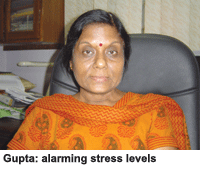 “In recent years, student stress and pressure has risen to alarming levels. Therefore it’s become absolutely vital for all educational institutions to provide counseling facilities delivered by professionally qualified counselors trained to listen, identify disruptive behaviour and help children suffering abuse and despair, self-destructive and/or suicidal tendencies. Unfortunately counseling services are available only in major cities and within a handful of progressive schools and colleges. In small towns and the rural hinterland, counseling is not even on the radar of educational institutions. This lacuna has to be addressed urgently because the mental and psychological health of children and youth is as important as their physical well-being,” says Prof. Ashum Gupta, former head of Delhi University’s psychology department and currently a well-known practising counselor in the national capital.
“In recent years, student stress and pressure has risen to alarming levels. Therefore it’s become absolutely vital for all educational institutions to provide counseling facilities delivered by professionally qualified counselors trained to listen, identify disruptive behaviour and help children suffering abuse and despair, self-destructive and/or suicidal tendencies. Unfortunately counseling services are available only in major cities and within a handful of progressive schools and colleges. In small towns and the rural hinterland, counseling is not even on the radar of educational institutions. This lacuna has to be addressed urgently because the mental and psychological health of children and youth is as important as their physical well-being,” says Prof. Ashum Gupta, former head of Delhi University’s psychology department and currently a well-known practising counselor in the national capital.
Gupta derives some comfort from the Delhi-based Central Board of Secondary Education — the largest national school-leaving examinations board which has 10,000 affiliated schools countrywide — having made it mand-atory for affiliated schools to offer counseling services delivered by quali-fied counselors. The Council of Indian School Certificate Examinations — India’s other exam board which has 1,571 premier affiliated schools — has also issued a directive to its schools to offer counseling facilities to students. “Despite the boards’ directives, only some progressive schools hire profes-sional counselors. In others, selected teachers are asked to play the role. This is dangerous as counseling is a specialised skill for which rigorous professional training is required,” says Gupta.
Among the progressive schools to invest in a professional team of counselors is Delhi’s CBSE-affiliated Springdales School, Dhaula Kuan. Ranked the country’s No. 4 day school in the EducationWorld-C fore India’s Most Respected Schools Survey 2010 (see EW September), Springdales established a fully-fledged inclusive education centre christened SaathSaath back in 2006. Staffed by a team of four certified counselors, SaathSaath offers a range of counseling services to the school’s 2,500 students. “SaathSaath is an inclusive education centre with customised programmes for special needs children, as well as a general counseling centre offering support and advice. Counselors advise our students to deal with issues such as bullying, poor self-esteem, parental confrontation over socialisation, loneliness and problems with academic pressure. While disturbed children are offered one-on-one counseling sessions, we conduct self-awareness workshops for all students to help them develop self-esteem and positive attitudes,” says Dr. Jyoti Bose, principal of Springdales.
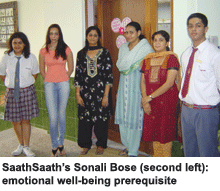 Adds Sonali Bose, who heads Springdales’ SaathSaath task force: “This is a haven where students are free to walk in and unburden their problems without hesitation. Sometimes even home visits are made by our counselors to address serious issues. In Springdales we believe the emotional and psychological well-being of students is a prerequisite of success in academics and life.”
Adds Sonali Bose, who heads Springdales’ SaathSaath task force: “This is a haven where students are free to walk in and unburden their problems without hesitation. Sometimes even home visits are made by our counselors to address serious issues. In Springdales we believe the emotional and psychological well-being of students is a prerequisite of success in academics and life.”
Likewise the management of Delhi’s Modern School, Barakhamba Road — ranked India’s No. 17 day school in the EW-C fore Schools Survey 2010 — recognises that student counseling is crucial to ensuring a stress-free educa-tional experience. The school’s Wellness Centre is staffed by three full-time counselors who offer emotional and psychological support to students and teachers. According to Baveen Gupta, a Wellness Centre counselor, the range of problems students report varies from peer pressure and high parental expectations to confusion over career choices. “In today’s fast-paced world, pressures are acute and students come to us with a wide span of symptoms difficult to categorise. Every student’s stress is unique in its own way and requires an individualised solution. Our Wellness Centre adopts a holistic approach, with services including career counseling, peer education to special needs children and support to deal with societal pressures. We have begun to develop student trainers — seniors who conduct group counseling sessions for younger students,” says Gupta.
The most common cause of student strain and anxiety according to the overwhelming majority of school counselors EducationWorld correspon-dents spoke with across the country, is unrealistic parental expectations and pressure to score high grades in annual examinations. Driven by the ambition to enrol their children into the country’s too-few high quality colleges — the annual scramble for admissions is intense, if not cut throat — millions of well-meaning parents are pushing children into a continuous round of private tuitions, intensive study sess-ions and cram schools. The outcome is pervasive fear of failure, paranoia and chronic depression among children. According to one estimate, in 2006-07 there were 5,857 exam-related suicides countrywide. And in nine out of ten cases, the cause of this final act of desperation was fear of parental wrath over sub-optimal academic performance.
“It’s commonplace in middle class India for ambitious parents to pile their unrealised dreams and expectations upon children. In their obsession with academic performance and social recognition, parents overload children with tuitions, music and dance lessons, sports etc and are prone to making demoralising comparisons with siblings and other children. This causes immense stress in young children, with some reacting with disruptive behaviour, depression, and in extreme cases suicide. Moreover broken homes and single parents have become common phenomena in Indian society, driving children to seek love and support outside, usually among peers. Parents must learn to appreciate and accept their children for what they are,” says Priya Warrick, an alumna of Cornell University, New York, and director of Priya Warrick Finishing Academy, Delhi who is also a practising clinical psychologist in the national capital.
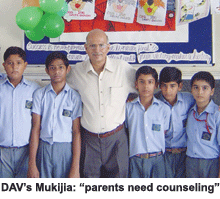 The pushy parent phenomenon has prompted some enlightened school managements to extend their counseling services to parent communities. Comments S.S. Mukijia, principal of the CBSE-affiliated DAV Public School, Delhi, which conducts orientation/self-awareness workshops for parents: “It’s usually parents who need counseling rather than children. They need to temper their great expectations which impose a heavy psychological burden on their children. A conducive and supportive home environment is vital for children to do well in school.”
The pushy parent phenomenon has prompted some enlightened school managements to extend their counseling services to parent communities. Comments S.S. Mukijia, principal of the CBSE-affiliated DAV Public School, Delhi, which conducts orientation/self-awareness workshops for parents: “It’s usually parents who need counseling rather than children. They need to temper their great expectations which impose a heavy psychological burden on their children. A conducive and supportive home environment is vital for children to do well in school.”
The rising occurrence of student stress which often culminates in self-destructive behaviour, is compounded by reluctance of the great majority of parents to acknowledge that their children could need counseling. Lata Vaidyanathan, a highly-respected educa-tionist and principal of Modern School, (Barakhamba Road), Delhi, says most parents are in denial when it comes to counseling. “Our school counselors spend a lot of time educating parents about the importance and benefits of counseling, and how it improves the parent-child relationship. Active involve-ment and parental support is crucial to enable children to heal, overcome phobias and challenges and discover their strengths,” says Vaidyanathan.
Similarly in the top-ranked (no.8) Sanskriti School, Delhi, counselors are obliged to devote considerable time to educating parents about the salutary effects of profess-ional counseling. “Most Indian parents are embarrassed about consulting a counselor. I have to work closely and patiently with parents and children to allow them time to accept the process. However in some cases, children don’t want their parents to know about their problems and request confidentiality. But a counselor must introspect carefully before accepting confidentiality requ-ests. For instance, if a child is into drugs and/or suffering sexual abuse, parents definitely need to be informed,” says Shivani, counselor at Sanskriti.
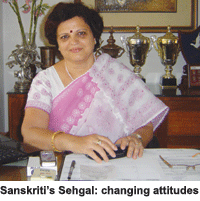 Adds Abha Sehgal, Sanskriti’s principal: “Fortunately parental attit-udes towards counseling are changing. Nowadays parents and students appreciate the presence of counselors within school premises.”
Adds Abha Sehgal, Sanskriti’s principal: “Fortunately parental attit-udes towards counseling are changing. Nowadays parents and students appreciate the presence of counselors within school premises.”
In the country’s top private independent schools, the alarming rise in the incidence of student stress and anti-social and/or self-destructive behaviour has prompted the establishment of counseling centres and services. Earlier, even in top-ranked schools, counselors were often entrusted with administrative duties or asked to substitute for absentee teachers. But not anymore, says Suruchi Gandhi, principal of the CBSE-affiliated Bal Bharati School, Dwarka, Delhi which has an enrolment of 2,471 students and 120 teachers. “Counseling isn’t a decorative function. Counselors are the lifeline of a school as they connect teachers, students and parents. Our school counselor works with children, parents and also teachers. Teachers require counseling too, beca-use if they’re under stress, it adversely affects their teaching and relationship with students,” says Gandhi.
Rohan Bhat, chairman of the Maharashtra state board-affiliated Children’s Academy chain of three schools in Mumbai which boast an aggregate enrolment of 9,914 students, concurs. “Today children and youth face more peer pressure and lifestyle problems than we ever did. If they aren’t advised and counseled by trained professionals in their teenage years, they could grow into dysfunc-tional and maladjusted adults. In all our schools we have positioned profes-sional counselors to offer students support and guidance to handle academic, parental and social pressures,” says Bhat.
While student counseling services as a vital component of academic life is a latter-day development in day schools, in the country’s estimated 10,000 boarding and new genre international schools, counseling is tacitly acknowledged as critical to delivering a stable and well-balanced educational experience. With students living away from home and the comforting presence of parents, pastoral care assumes greater importance in residential schools.
 Fortuitously a majority of the country’s legacy boarding schools have established traditions of excellent pastoral care and professional couns-eling facilities for their student populations. A case in point is the fully residential CIE (UK)-affiliated Hebron School (estb.1899) which provides high quality guidance and care to its 366 students living in 13 well-equipped dormitories. Each dormitory is limited to 20 students parented by a married couple with the support of other staff. One of the first boarding schools in the country to set up a professional counseling unit, the school’s four-member-strong Department of Personal Development (DPD) counsels students on a range of academic, personal and career-related issues.
Fortuitously a majority of the country’s legacy boarding schools have established traditions of excellent pastoral care and professional couns-eling facilities for their student populations. A case in point is the fully residential CIE (UK)-affiliated Hebron School (estb.1899) which provides high quality guidance and care to its 366 students living in 13 well-equipped dormitories. Each dormitory is limited to 20 students parented by a married couple with the support of other staff. One of the first boarding schools in the country to set up a professional counseling unit, the school’s four-member-strong Department of Personal Development (DPD) counsels students on a range of academic, personal and career-related issues.
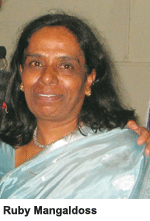 “Boarding schools are very different from day schools in that students live in school 24/7. Therefore they require a strong emotional support network comprising teachers and peers. Though most children fare well, some are unable to cope with separation from parents. Moreover boarding schools in general have often been blamed for ill-treatment of children and there are instances of bullying and ragging of juniors. But much progress has been made and now there is both a better understanding and practice of caring for children in residence. At Hebron we realised the importance of counseling early and pioneered a unique department of personal development to facilitate positive, open communication between parents and children before the latter enter school, followed by orientation in school, to help students adjust and settle into residential life. DPD also has trained career counselors who advise students to make appropriate future study choices,” says Ruby Mangaldoss, former head of DPD and currently a board member of Hebron School, ranked India’s No.5 international school in the EW-C fore Schools Survey 2010.
“Boarding schools are very different from day schools in that students live in school 24/7. Therefore they require a strong emotional support network comprising teachers and peers. Though most children fare well, some are unable to cope with separation from parents. Moreover boarding schools in general have often been blamed for ill-treatment of children and there are instances of bullying and ragging of juniors. But much progress has been made and now there is both a better understanding and practice of caring for children in residence. At Hebron we realised the importance of counseling early and pioneered a unique department of personal development to facilitate positive, open communication between parents and children before the latter enter school, followed by orientation in school, to help students adjust and settle into residential life. DPD also has trained career counselors who advise students to make appropriate future study choices,” says Ruby Mangaldoss, former head of DPD and currently a board member of Hebron School, ranked India’s No.5 international school in the EW-C fore Schools Survey 2010.
Likewise in Bangalore’s IBO, (Geneva)-affiliated Indus International School (estb. 2003, and ranked India’s No.3 international school), which has 198 boarders and 778 day scholars on its muster roll, a robust counseling department was set up ab initio to cater to psychological needs of students. Ishita Datta, the school’s counselor, believes that while problems of day scholars and boarders are largely similar, the latter need special attention and care. “Boarders need an emotionally bolst-ering environment in school. Adoles-cents have less emotional reserves and can get alienated in their very fragile stage of life. Student stress can be induced by diverse pressures such as overload of assignments, packed curriculums, exam phobia, peer pressure, socio-economic stress and/or oppre-ssive home environments. The role of a professional counselor and/or teacher is to identify tell-tale signs of student distress and offer immediate remedial help,” says Datta.
Unsurprisingly while India’s 188,000 private day, boarding and international primary-secondaries are becoming incrementally aware of the need to service the emotional well-being of students, there’s little awareness about the value of counseling within the government school network. India’s 135 million children enroled in 1.09 million government schools countrywide — despite having to bear with a plethora of problems including teacher shortages and truancy, inadequate infrastructure and poor learning outcomes — seldom have recourse to any form of counseling services or advice.
Shockingly, even in the country’s 1,073 Central-government promoted showpiece Kendriya Vidyalaya schools, professionalised student counseling is an unknown concept. Admits A.K. Pandey, principal of the highly-resp-ected KV, Andrews Ganj, Delhi: “We don’t employ professional counselors. Instead, some teachers offer voluntary counseling services to students. Most of these volunteers attend the couns-eling course conducted by NCERT, so they know the basics of career couns-eling, how to deal with peer pressure and other socio-economic stress.”
Likewise V. Ramaiah, principal of KV, Arakkonam, Chennai, admits to making do with informal counseling. “We don’t have professional counselors in school, but some trained teachers for rudimen-tary counseling. Professional experts are invited to speak to secondary school students on making appropriate career choices,” he says.
Surprisingly, even in India’s 509 universities and 31,000 colleges there’s a curious lack of awareness about the importance of student counseling services. According to Dr. Ashum Gupta, former head of Delhi University’s psychology department (quoted earlier), the great majority of higher education institutions are ill-equipped to offer students any type of remedial psychological assistance. “At Delhi University, the norm is for a group of colleges to appoint a counselor under the Women’s Development Care scheme on a contractual basis. This in effect shuts out male students from accessing counseling services. There’s an urgent need to address this lacuna and build a strong support network of professional counselors and psychologists in higher education institutions,” says Gupta.
Exceptions to the rule are the country’s elite and highly-selective nine Indian Institutes of Management and 15 Indian Institutes of Technology. These highly-subsidised institutions of higher learning, which admit only the very brightest of the best who clear their mind-numbing entrance exam (of the 384,977 students who wrote the IIT-JEE in 2009 only 8,295 were admitted), follow a grueling academic schedule. For students wilting under the load of assignments and curriculum, these blue-chip institutes have exemplary counseling systems comprising profes-sional and peer counseling.
For instance IIM-Bangalore boasts a 15-member student counseling body christened Mitr (‘friend’) in addition to Vishwas, (‘trust’), its professionally staffed counseling centre, while IIT-Madras has a fully-fledged professional guidance and counseling unit. IIT-Mumbai has gone a step further and in addition to an official counseling centre, it has introduced an academic rehabi-litation programme (ARP) under which senior students and faculty mentor laggard students, who are allowed to take fewer subjects in the initial years.
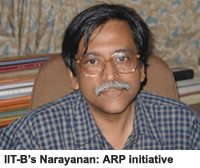 “Before we introduced ARP, students with low scores were routinely expelled. In 2007 we had to expel the son of a daily wage labourer who couldn’t cope because he wasn’t proficient in English. That’s when we started ARP with the help of some students. The programme works at the institutional, departmental and student levels. First-year students known as mentees are placed under supervision of senior student mentors. Those whose academic performance flags mid-way, are allotted profess-oriate, in addition to senior student, mentors. Mentors meet their mentees regularly and help them maintain a healthy balance between their academic, cultural and social lives. Since the introduction of ARP, more than 50 percent of stragglers have been brought up to speed,” says H.N. Narayanan, professor of electrical engineering and one of the conveners of ARP.
“Before we introduced ARP, students with low scores were routinely expelled. In 2007 we had to expel the son of a daily wage labourer who couldn’t cope because he wasn’t proficient in English. That’s when we started ARP with the help of some students. The programme works at the institutional, departmental and student levels. First-year students known as mentees are placed under supervision of senior student mentors. Those whose academic performance flags mid-way, are allotted profess-oriate, in addition to senior student, mentors. Mentors meet their mentees regularly and help them maintain a healthy balance between their academic, cultural and social lives. Since the introduction of ARP, more than 50 percent of stragglers have been brought up to speed,” says H.N. Narayanan, professor of electrical engineering and one of the conveners of ARP.
The IITs/IIMs apart, the lack of counseling culture in the overwhelming majority of India’s colleges and universities is in sharp contrast to higher education institutions in the West, the US in particular, where it’s mandatory for all higher education institutions to provide professional counseling services. Likewise, it’s mandated in all public and private schools.
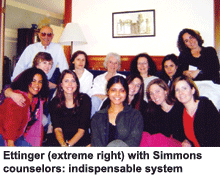 “Counseling is an indispensable support system for children and youth in the US, and all educational instit-utions provide professional assistance to students in distress. Difficulties with academic pressure, repressive home environments, juvenile delinquency, drugs and sexual abuse, and racial discrimination are common issues that counselors advise upon. A recent addition has been anxiety over financing higher education and inability to repay student loans because of the economic recession. All counselors are professi-onally trained to handle these and other issues and form an integral part of the American educational system,” says Dr. Sherri Ettinger, the Boston-based clinical director of Simmons Counseling Centre, Massachusetts, USA.
“Counseling is an indispensable support system for children and youth in the US, and all educational instit-utions provide professional assistance to students in distress. Difficulties with academic pressure, repressive home environments, juvenile delinquency, drugs and sexual abuse, and racial discrimination are common issues that counselors advise upon. A recent addition has been anxiety over financing higher education and inability to repay student loans because of the economic recession. All counselors are professi-onally trained to handle these and other issues and form an integral part of the American educational system,” says Dr. Sherri Ettinger, the Boston-based clinical director of Simmons Counseling Centre, Massachusetts, USA.
Unsurprisingly, educational and training facilities for counselors are excellent, with most universities and colleges in the US offering specialised clinical and counseling certification programmes in family, marriage, career and adolescent care. The American Psychology Association (APA) also accredits high-quality counseling programmes of universities. In addition all 52 states of the US have some form of counselor licensure that governs the practice of counseling.
Unfortunately in India only a handful of institutions (NIMHANS, Bangalore and Bharathiar University, Coimbatore) offer postgraduate and doctoral study programmes in student counseling. Mostly, it’s studied as a subject in the Master of psychology degree progra-mme of universities. Comments Abha Adlakha, a psychology postgraduate of Amity University and counselor at Bal Bharti School, Delhi: “My psychology postgraduate programme didn’t fully equip me to practice as a student counselor. I had to train for two years under a senior practising psychologist to acquire confidence to practice as an independent counselor. There’s defi-nitely a dearth of educational and training facilities for counselors.”
Meanwhile following the liberalisation and deregullation of the Indian economy and its integration with the crystallising global economy, career options have multiplied manifold. Against this backdrop, career guidance and coun-seling is fast becoming as imperative as emotional counseling in educational institutions. Career counselors assess the capabilities of secondary school and college students through aptitude/personality/interest tests, provide information on various career options and help them make career decisions in sync with their aptitudes and personality.
.gif) “Fifteen years ago career guidance and planning was uncommon. But now it’s acknowledged as vital in helping students maximise their personal potential and simultaneously optimise their contribution to society. A career counselor must discharge his role in a scientific and culture-resonant manner. Unfortunately in India the training facilities for individuals interested in this field are inadequate. We are organising the first ever international conference on career guidance and counseling in India in October, where a galaxy of international speakers will present over 100 papers on the subject. This, we hope, will spark interest and research on the subject in India,” says Dr. Gideon Arulmani, an alumnus of University of Portsmouth (UK) and founder-director of the Promise Foundation (estb.1987), Bangalore. A pioneer in career guidance and counseling, Promise Foundation offers several short-term training programmes as well as an M.Phil degree in career counseling in association with Martin Luther University, Meghalaya and Canterbury Christ Church University, UK.
“Fifteen years ago career guidance and planning was uncommon. But now it’s acknowledged as vital in helping students maximise their personal potential and simultaneously optimise their contribution to society. A career counselor must discharge his role in a scientific and culture-resonant manner. Unfortunately in India the training facilities for individuals interested in this field are inadequate. We are organising the first ever international conference on career guidance and counseling in India in October, where a galaxy of international speakers will present over 100 papers on the subject. This, we hope, will spark interest and research on the subject in India,” says Dr. Gideon Arulmani, an alumnus of University of Portsmouth (UK) and founder-director of the Promise Foundation (estb.1987), Bangalore. A pioneer in career guidance and counseling, Promise Foundation offers several short-term training programmes as well as an M.Phil degree in career counseling in association with Martin Luther University, Meghalaya and Canterbury Christ Church University, UK.
Clearly, the exigencies of a contem-porary, post-liberalised student culture demand professionally advanced counseling servi-ces to deal with the burgeoning problem of student stress and anguish. With India’s 188,000 private schools getting ready to implement the Right to Education Act, which man-dates induction of children from under-privileged back-grounds into elite private schools, the demand for professional counselors will intensify as institutional managements grapple with issues of student integration, adjustment and diversity.
The need to make counseling services available in the country’s 1,000,000-plus government schools, and 509 universities and 31,000 colleges is as pressing. The myriad problems of snowballing student stress and aberrant behaviour require more than casual teacher-student interaction. It calls for active intervention by seasoned counselors. At stake is the emotional well-being of the country’s 480 million children from among whom India’s future leaders will emerge.
With Swati Roy & Anupama Patil (Mumbai) & T. Varoodhini (Bangalore)